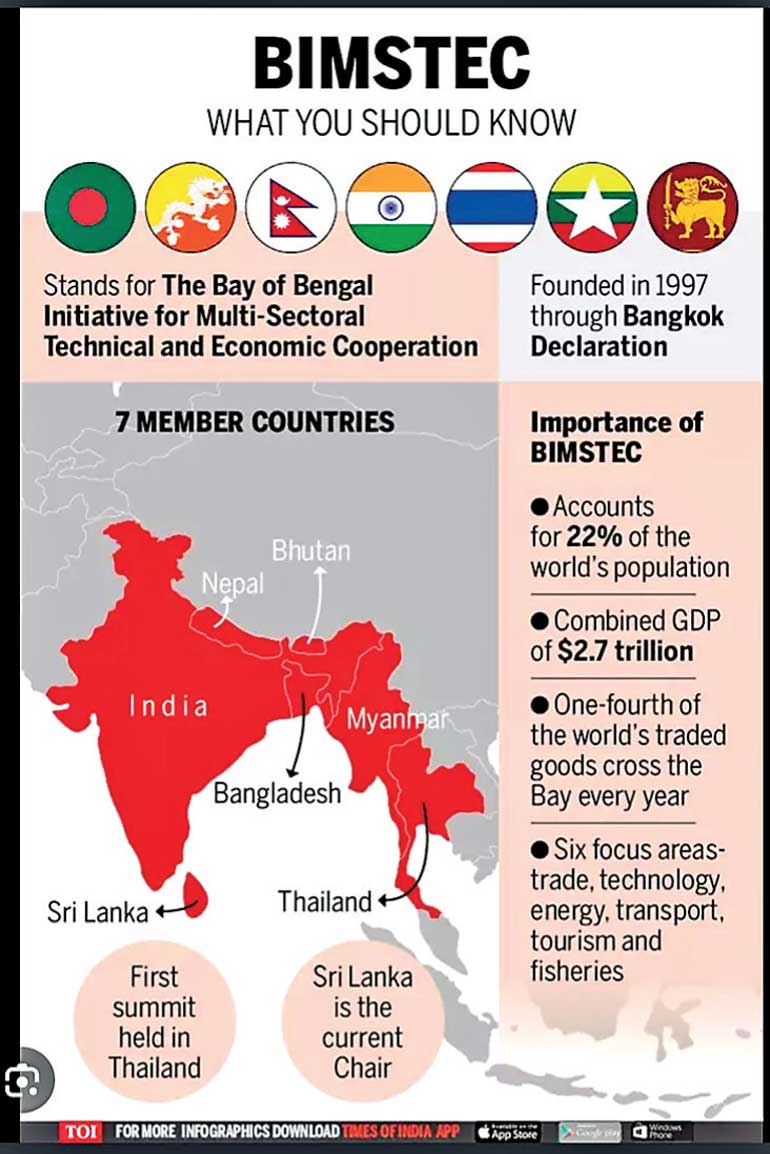Thursday Feb 19, 2026
Thursday Feb 19, 2026
Thursday, 6 June 2024 00:00 - - {{hitsCtrl.values.hits}}

In a historic development, the BIMSTEC Charter entered into force on 20 May 2024. It was signed on 30 March 2022 by the Leaders of BIMSTEC member States in Colombo, Sri Lanka. The Charter articulates the long-term vision and commitment of the BIMSTEC member States to cooperate through the BIMSTEC framework to realise a peaceful, prosperous and secure Bay of Bengal Region. The Charter establishes the legal and institutional framework for cooperation in the region; confers legal personality on the Organisation; enables admission of new members and observers; and empowers conclusion of agreements with other countries and organisations. It enables the BIMSTEC to engage with the UN and other International Organisations as well as Regional Organisations to pursue development partnerships to enhance cooperation in the Bay of Bengal region to deal with the shared developmental and security-related challenges.
On 6 June 2024, BIMSTEC completes 27 years of its journey that started in Bangkok, in 1997, as “Bangladesh, India, Sri Lanka, Thailand Economic Cooperation” (BIST-EC) when these four countries came together to sign the Bangkok Declaration, committing to utilise the synergies in their capabilities and resources for their development. When Myanmar joined the group in 1997, BIST-EC became BIMSTEC (Bangladesh, India, Myanmar, Sri Lanka, Thailand – Economic Cooperation). Later, when Bhutan and Nepal joined in 2004, the BIMSTEC was renamed as the “Bay of Bengal Initiative for Multi-Sectoral Technical and Economic Cooperation.”
Regional cooperation under BIMSTEC has made steady progress and has been gaining momentum. It has been anchored by the BIMSTEC Secretariat, which was established in Dhaka, Bangladesh, in September 2014 and is headed by its Secretary General. In 2018, it was decided that the vision and goals of regional cooperation under the BIMSTEC should be constitutionalised in a Charter; eventually it was signed in March 2022 and entered into force on 20th May this year.
Stepping into the 28th year of its existence, the BIMSTEC not only has a Charter and its Secretariat, but also a well-defined and comprehensive Agenda for cooperation. At the 5th Summit in March 2022, BIMSTEC Leaders had decided to reconstitute various areas of cooperation into 7 sectors with each member State taking the lead in a specific Sector: Trade, Investment and Development including Blue Economy (Bangladesh); Environment and Climate Change including Mountain Economy (Bhutan); Security including Counter-Terrorism and Transnational Crime, Disaster Management, and Energy (India); Agriculture and Food Security including Fisheries and Livestock (Myanmar); People-to-People Contact including Culture, Tourism, Poverty Alleviation, and People-to-People Contact Forums (Nepal); Science, Technology and Innovation including Health and Human Resource Development (Sri Lanka); and Connectivity (Thailand).
BIMSTEC also has a well established institutional framework, comprising core and sectoral mechanisms, to forge regional cooperation in the above sectors. These include Meetings at the level of Senior Officials and Ministers as well as numerous Working Groups, Expert Groups and BIMSTEC Centres.
Later this year, at the 6th BIMSTEC Summit, scheduled to be held in Bangkok, the Leaders are expected to adopt the ‘Bangkok Vision 2030’ aimed at achieving a ‘Prosperous, Resilient and Open BIMSTEC by 2030.’ This is the first time that a time-bound Vision will be adopted by the BIMSTEC Leaders, which will guide regional cooperation within the BIMSTEC framework.
Aware that the time has come to transform the BIMSTEC, the Leaders have set up an Eminent Persons’ Group (EPG) and mandated it to make recommendations to reform, revitalise and repurpose BIMSTEC. The EPG is expected to submit its Report to the Leaders at their 6th Summit. Its recommendations are expected to herald a new era of regional cooperation within the BIMSTEC.
The BIMSTEC region is home to over 1.8 billion people, approximately 22% of the global population. The combined external trade of the BIMSTEC member States in 2022 amounted to USD 1.95 trillion while their combined GDP was estimated at USD 4.5 trillion. These underline the strategic significance of the Bay of Bengal region and the BIMSTEC as a regional organisation.
BIMSTEC has enjoyed the requisite political support of its members, it has focused on technical and economic cooperation and has stayed away from political issues. The UN and International Organisations as well as extra-regional countries find BIMSTEC a natural choice for partnering with it in realizing the shared goals of security and sustainable development in the Bay of Bengal region. BIMSTEC has signed MoUs with the Asian Development Bank (ADB) and the International Food Policy Research Institute (IFPRI), while MoUs with IORA (Indian Ocean Rim Association), the World Bank, UNODC (UN Office on Drugs and Crime), UNESCAP (UN Economic and Social Commission for Asia and the Pacific) etc. are under consideration. Moreover, in the evolving global scenario, particularly in view of the stalemates in the UN and International Organisations, regional platforms, like BIMSTEC, are being seen as effective instruments for forging plurilateral cooperation amongst the countries of a region to realise their shared security and developmental goals.
All the 7 BIMSTEC member States have been committed to striving to attain the SDGs. To realise these goals, they have been committed to pursuing regional cooperation through BIMSTEC. They recognise that they share common interests and purposes and face common challenges. They have demonstrated the requisite political will to shape the BIMSTEC into an effective and efficient regional organisation to realise their vision for a secure and developed Bay of Bengal region.